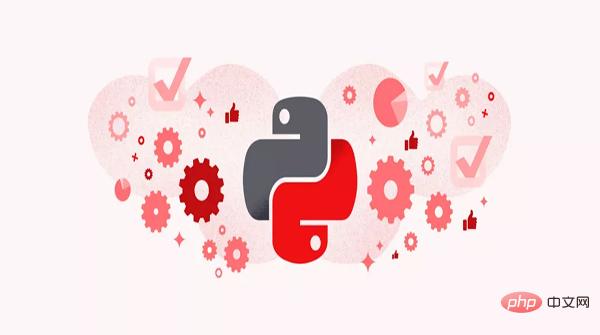Home >Backend Development >Python Tutorial >Python Dictionary: Is there any advanced gameplay that I don't know how to do?
Python Dictionary: Is there any advanced gameplay that I don't know how to do?
- WBOYWBOYWBOYWBOYWBOYWBOYWBOYWBOYWBOYWBOYWBOYWBOYWBforward
- 2023-04-11 23:58:081691browse

Generate dictionary from sequence
We convert the following sequence into dict type.
lst = [('a', 1), ('b', 2), ('c', 3)]
Common writing method
for k, v in lst: dic[k] = v
More pythonic writing method
Use dictionary derivation to quickly generate a dictionary.
{k: v for k, v in lst}
Default value of key
When the specified key does not exist, set the value to 0.
Ordinary writing method
if key not in dct: dct[key] = 0
pythonic writing method
dct[key] = dct.get(key, 0)
Exchange key and value
Ordinary writing method
dic = {'Python': 1, 'Java': 2}
new_dic = {}
for k, v in dic.items():
new_dic[v] = k
More pythonic writing method
dic = {'Python': 1, 'Java': 2}
new_dic = {v: k for k, v in dic.items()}
Sequence modification and initialization
Sample data
lst = [('a', 1), ('b', 2), ('c', 3)]
dic = {'a': [0]}
If we need to update the data in dic based on lst, when the key exists, the value will be added to the end of the original sequence , otherwise initialize value and save it in sequence.
Ordinary writing method
for key, value in lst: if key in dic: dic[key].append(value) else: dic[key] = [value]
More pythonic writing method
for (key, value) in lst:
group = dic.setdefault(key, [])
group.append(value)
# dic:{'a': [0, 1], 'b': [2], 'c': [3]}
setdefault(key, default) will first determine whether the key exists. If it exists, it will return dct[key], if it does not exist, it will return Then set dct[key] to [] and return.
Key, items set operation
If we now need to obtain the mapping information of the intersection of the keys of two dictionaries.
Ordinary writing method
dic1 = {'Python': 1, 'Java': 2, 'C': 3}
dic2 = {'Python': 3, 'Java': 2, 'C++': 1}
new_dic = {}
for k, v in dic1.items():
if k in dic2.keys():
new_dic[k] = v
print(new_dic)
# {'Python': 1, 'Java': 2}
More pythonic writing method
dic1 = {'Python': 1, 'Java': 2, 'C': 3}
dic2 = {'Python': 3, 'Java': 2, 'C++': 1}
print({k: dic1[k] for k in dic1.keys() & dic2.keys()})
# {'Python': 1, 'Java': 2}
The dic1.keys() & dic2.keys() here use keys() for set operations , items() can also perform set operations.
If we now want to obtain the same key and value parts in two dictionaries
dic1 = {'Python': 1, 'Java': 2, 'C': 3}
dic2 = {'Python': 3, 'Java': 2, 'C++': 1}
print(dic1.items() & dic2.items())
# {('Java', 2)}
Flexibly use the characteristics of keys and items() set operations to quickly extract the content we want.
Sort the dictionary by key or value
Use the sorted() function to quickly sort the key or value.
dic = {'a': 2, 'b': 1, 'c': 3, 'd': 0}
lst1 = sorted(dic.items(), key=lambda x: x[0], reverse=False)
# [('a', 2), ('b', 1), ('c', 3), ('d', 0)]
lst2 = sorted(dic.items(), key=lambda x: x[1], reverse=False)
# [('d', 0), ('b', 1), ('a', 2), ('c', 3)]
print('按照键降序:', {key: value for key, value in lst1})
print('按照值降序:', {key: value for key, value in lst2})
# 按照键降序: {'a': 2, 'b': 1, 'c': 3, 'd': 0}
# 按照值降序: {'d': 0, 'b': 1, 'a': 2, 'c': 3}
Multiple dictionary sorting
If a sequence contains multiple dictionaries, these dictionaries must now be sorted according to conditions. This can also be achieved using the sorted() function.
dict_list = [
{'letter': 'B', 'number': '2'},
{'letter': 'A', 'number': '3'},
{'letter': 'B', 'number': '1'}
]
# 按 letter 排序
print(sorted(dict_list,
key=lambda dic: dic['letter']))
# 按 letter, number 排序
print(sorted(dict_list,
key=lambda dic: (dic['letter'], dic['number'])))
# [{'letter': 'A', 'number': '3'}, {'letter': 'B', 'number': '2'}, {'letter': 'B', 'number': '1'}]
# [{'letter': 'A', 'number': '3'}, {'letter': 'B', 'number': '1'}, {'letter': 'B', 'number': '2'}]
Of course, if you know itemgetter(), the above code can be changed and the execution speed will be faster.
from operator import itemgetter
print(sorted(dict_list
key=itemgetter('letter')))
print(sorted(dict_list,
key=itemgetter('letter', 'number')))
itemgetter() does not obtain a value, but defines a function through which it is applied to the target object.
The above is the detailed content of Python Dictionary: Is there any advanced gameplay that I don't know how to do?. For more information, please follow other related articles on the PHP Chinese website!

